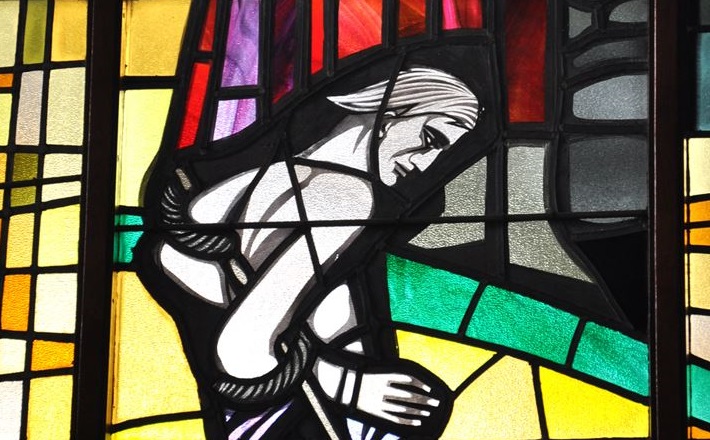Commentary on 1 Samuel 8:4-11 [12-15] 16-20; [11:14-15]
Kingship was always initiated from the gods above, less one notable exception.
According to the Code of Hammurapi, the Near Eastern deity Marduk entrusts his law to the earthly king, Hammurapi who ruled over Babylonia for an astonishing 42 years (1692-1650 BC). When looking at the image of the code, most viewers mistakenly assume that Hammurapi is the one on the throne. The assumption is forgivable, after all, he was a great king and the stele is famously known as the “Code of Hammurabi.” But in fact, Hammurabi is not sitting on the throne, but he is the standing one, humbly receiving the scepter from the enthroned Marduk.
This image expresses the standard understanding of kingship in the ancient Near East. The gods created the institution of monarchy so that their will would be executed on earth through earthly rulers. Accordingly, the prologue to the Code of Hammurapi declares, “Anu and Bel (deity names) called by name me, Hammurapi, the exalted prince, who feared God, to bring about the rule of righteousness in the land.” In the ancient Near East, kingship was initiated by the gods and descended onto humankind.
But 1 Samuel 8 presents a radically different origin of kingship for Ancient Israel. Rather than “descending from above,” the biblical texts describe the origin to kingship as “rising from below.” During a period of transition brought on due to crisis (the aging of Samuel 8:1), the elders decide that the sons of Samuel are corrupt (v. 5), thus they request to have a “king to govern” so that they could “be like other nations” (v. 5).
Samuel reacts to the elders’ request out of sadness. Interestingly, the sadness does not arise from the accusation of his sons’ failures. Those accusations were true and they undoubtedly grieved Samuel. But the text bypasses Samuel’s reactions to the moral judgment on his sons.
Instead v. 6 states that Samuel was saddened because of the people’s request for a king. As Samuel knew that such a request indicated a lack of faith in God. Samuel responds in a prayer, presumably because he feels like a failure to God. He led a community of faith, but despite Samuel’s efforts, the people forsook YHWH and instead wanted to “be like the other nations.” God comforts Samuel by emphasizing that it was the people’s decision, implying their own autonomy to do right from wrong. The Hebrew changes the typical order to emphasize that “it is not you, they rejected, but me, they rejected” (v. 7).
We can pause and think about the issue of agency between Samuel and the people of Israel. Although Samuel was a divinely called leader, this leadership had limitations. Ultimately, God grants people agency — the freedom to make good and bad decisions. A few verses later, we see that God self-limits his own authority. Twice, he instructs Samuel “to listen to the voice of the people” (vv. 7, 9), a phrase, which could be better translated as, “to obey the people.”
But the freedom of choice necessitates an obligation to take consequences of such decisions. God lets go of his authority, but he delivers a stern message, reminding them of the ways in which God has provided in the past (v. 8), but more importantly, showing the people the repercussions of kingship on the nation of Israel in vv. 12-18. At this point, the reference to Samuel’s wayward sons is not just a contextual detail. I suspect that naming the circumstance of the prodigal sons of Samuel helps us to visualize the parent-child analogy to get a better sense of God’s experience, as he allows us our own agency and our own consequences. When parents give freedom to children, they understand that the children must bear the repercussions of their own decisions. Sometimes we forget that the parents must also share in some of those painful repercussions.
Two literary devices emerge at the end of this list that contrast the wisdom of God through Samuel and the folly of this decision of the people. In v.17, Samuel warns that this new king will force the people to become his slaves. This contrasts to the reminder in v. 8 that God was the one who actually liberated the people from slavery. And in v. 19, the people refused to listen to the voice of Samuel in contrast with God’s self-denial, as he limits his own authority.
And this begins the monarchy of Israel. Unlike her Near Eastern neighbors, Ancient Israel incorporated kingship in an effort to be like others, and fight their battles. This was not a case of divine initiative installing a royal line. Rather, elders of Israel had the opportunity for a true theocracy, or rule by God, but they foolishly chose something else. God’s response resembles a parent: warn them, let them make the decision, and leave them to face any consequences.
It turns out that most of the warnings come true in Solomon. But the monarchy endures, and despite its origins, God uses kingship to execute his will during the 400 years of Davidic reign. God limits power to allow for us to make decisions. But God also shows his power of grace, by allowing our poor decisions to be made great, in this case, in the form of a Davidic dynasty with a historical significance beyond measure.
For although Israelite kingship began from below, it would be redeemed from above many centuries later through the coming of Jesus of Nazareth.


June 7, 2015